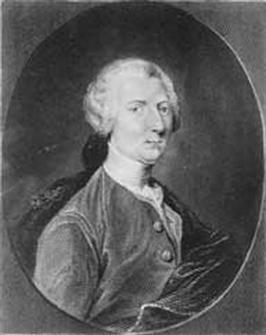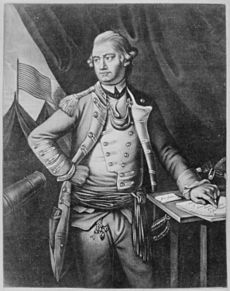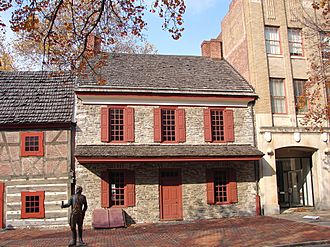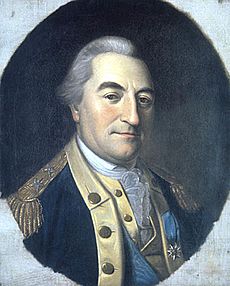Conway Cabal facts for kids

The Conway Cabal was a time during the American Revolutionary War when some important army officers and politicians questioned George Washington's leadership. They thought he should be replaced as the leader of the Continental Army. The group was named after General Thomas Conway, who wrote letters criticizing Washington. When these criticisms became public, Washington's supporters helped him. In the end, Conway left the army, and General Horatio Gates, who some wanted to replace Washington, said he was sorry for his part. There was never a formal plan to remove Washington. This was the only big challenge to Washington's command during the war.
Contents
Why People Questioned Washington
In the fall of 1777, the British army captured Philadelphia, which was the capital of the American colonies. The Second Continental Congress had to move to York, Pennsylvania. Washington's army had lost battles at Brandywine and Germantown. These losses made many people in the army and Congress wonder if Washington was the right person to lead.
Meanwhile, General Horatio Gates had a big victory in the north. His army defeated John Burgoyne's British forces at the Battle of Saratoga. Burgoyne had to surrender his entire army. Gates took a lot of credit for this win. Some historians believe that Benedict Arnold played a bigger role in the victory.
After Saratoga, Gates was supposed to send his report to Washington, who was his boss. But Gates sent his report directly to Congress instead. This showed he was not following the usual rules. Washington then sent his officer, Alexander Hamilton, to Gates. Hamilton was supposed to ask Gates to send some of his troops to Washington. Washington needed more soldiers to fight the British army near Philadelphia. Gates did not want to send his troops at first. He eventually agreed to send two brigades (groups of soldiers).
Many people who were unhappy with Washington did not work together in a secret plot. They mostly just shared the idea that Washington was not the best commander. General Gates was seen as a possible replacement. Some members of Congress, like Richard Henry Lee and John Adams, also wanted Congress to have more control over the war.
Conway's Critical Letter

Thomas Conway was an Irish officer who had served in the French army. He joined the Continental Army in 1777 and fought well in some battles. In October 1777, Conway started asking Congress to promote him to major general. In his letters, he also criticized Washington. Washington did not trust Conway and found him arrogant. Washington thought that many American officers deserved promotions more than Conway. He believed promoting Conway would hurt the army.
As part of his efforts to get promoted, Conway wrote a letter to General Gates. In this letter, he reportedly said something like: "Heaven has been determined to save your Country; or a weak General and bad Counsellors would have ruined it." This was a clear criticism of Washington.
General William Alexander (Lord Stirling) received a letter that included this quote. He sent it to Washington on November 8, 1777. This made Washington think that some of his officers might be plotting against him. He knew Gates was popular and had strong connections in Congress.
Washington wrote a short letter to Conway, quoting the critical line. Conway said he wrote to Gates but denied writing that exact quote. He also criticized Washington again in his reply. Washington never saw the original letter Conway sent to Gates. However, another person, Henry Laurens, did see it and sent Washington a part of it. It said: "What pity there is but one General Gates! but the more I see of this Army the less I think it fit for general Action under its actual Chiefs [...] I speak to you sincerely & wish I could serve under you."
General Thomas Mifflin, whom Washington also distrusted, told Gates about the letter. Gates then wrote to Washington, complaining that his letters had been "stolen." This made Washington's relationship with Gates even worse.
The Board of War
Washington had suggested creating a "Board of War." This board would help supply the army. He also wanted to appoint an experienced foreign officer as Inspector General. Mifflin and Lee changed Washington's idea. They wanted the Board of War to be the top military authority. The Inspector General would supervise Washington and report directly to this board. Congress approved this plan.
In mid-November, Congress appointed Mifflin and Gates to the Board of War. Conway's request to resign was sent to this new board, but they rejected it.
What Happened Next
Conway received his promotion to Inspector General of the Army on December 13, 1777. Eventually, Washington revealed that James Wilkinson was his source for the letter. Gates was forced to apologize for his letters with Conway. General Conway officially resigned from Congress in April 1778, and his resignation was accepted.
Washington was still unhappy. He encouraged his supporters to challenge Conway and his allies to duels. Wilkinson challenged Gates, but Gates apologized, and the duel was called off. On July 4, 1778, Conway fought a duel with Brigadier General John Cadwalader. Cadwalader shot Conway in the mouth. Conway later recovered and returned to France. He wrote an apology to Washington, but Washington never replied.
There is no proof that anyone involved ever formally tried to remove Washington. It was not a true "cabal" or secret plot. Instead, it was a group of military leaders and congressmen who did not have full confidence in Washington. Some of them wanted General Gates to replace him. After the Conway Cabal, the country mostly supported Washington. He became a symbol of national unity. No other major attempts were made to replace him during the rest of the war.
 | John T. Biggers |
 | Thomas Blackshear |
 | Mark Bradford |
 | Beverly Buchanan |



